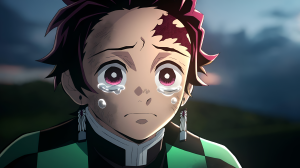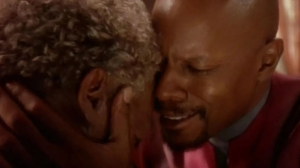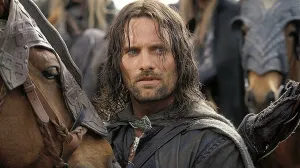What makes a great series finale? Well, typically, fans want closure for their favorite characters and the most important stories of the show. While the Arrow finale, which airs tomorrow night, promises a bit of that, there is one thing that the series won’t have too much of: the title character. Oliver Queen (Stephen Amell) sacrificed his life to save the universe in “Crisis on Infinite Earths,” and the final two episodes of Arrow have taken place in a world where Oliver is already dead. The finale, then, will use a flashback to the early part of season one (rather, to events that happened during that period of time, not actual events that happened on the show) to give fans a look back at Oliver and John Diggle (David Ramsey) in the earliest days of their partnership, before even Felicity Smoak (Emily Bett Rickards) joined up with Team Arrow (making it, y’know…a team rather than a duo).
Videos by ComicBook.com
Series co-creator Marc Guggenheim, who served as the showrunner on “Crisis” and helped write the Arrow finale, said that writing a finale that takes place after your main character is already gone was a challenge. He also noted that, with Oliver’s death foretold at the end of season seven and planned even before that, the writers had plenty of time to figure out a fix.
“It definitely made it more of a challenge, let’s put it that way. It definitely required a different kind of finale,” Guggenheim told ComicBook.com. “The good news is that we’ve had this plan in place for over a year, so that’s a long time to think about something. It’s a long time to come up with ideas and sort of stress-test ideas. We just embraced the idea that this would be a more of an epilogue, more of a coda type of finale, than a finale where everything blows up or a major storyline is resolved.”
“There’s a bunch of different ways to end a show,” he added. “This is probably one of the more unconventional ways, because we presented ourselves with an unconventional challenge.”
Of course, one thing that the episode will do is return to the flashback format that helped shape the show’s narrative over its first five seasons. Since Oliver was shipwrecked and then lost away from home for half a decade, that gave the show five years’ worth of flashbacks to work with, which would often be used to mirror something going on in the main plot to make a narrative point. After five years, they ran out of track on the flashbacks, and after taking a season off, came back in the show’s seventh season with a new device: flash-forwards, introducing fans to Oliver’s daughter (and eventually heir to the Green Arrow name), Mia Smoak-Queen (Katherine McNamara).
“Yeah. We went into the finale knowing several things,” Guggenheim told ComicBook.com. “We knew that it would mostly focus on the fallout from the death of Oliver and ‘Crisis.’ We knew that we wanted to have Stephen be present in the episode via a flashback to season one, partially because looking back on the first season of a long-running show is a good way to end a series — [like the Star Trek: The Next Generation episode] ‘All Good Things.’ We also knew that would help honor the flashback convention, which was an important part of the show for five years. We also knew that flashback story would basically be our final punctuation mark on the action sequences that have also defined the show — that we were going to go balls out and leave everything on the field in terms of our action.”
As he did earlier today on Twitter, Guggenheim added that he was still incredulous that Arrow had managed not to get nominated for an Emmy Award for stunts at any point during the first seven seasons of its run. Stunt coordinator James Bamford has become such a key part of the Arrow team that he has been tapped to direct a number of the most important episodes in recent years, and Guggenheim said that while he hated to ever single out other shows for criticism, it was hard to watch series where action and stuntwork was not a primary part of their appeal consistently be nominated over shows like Arrow, which is pervaded by a string of complex stunts.
Arrow will end its eight-season run tomorrow night at 9 p.m. ET/PT on The CW — but you can also tune in at 8 p.m. for a series retrospective, Hitting the Bullseye, which will air ahead of the finale.








